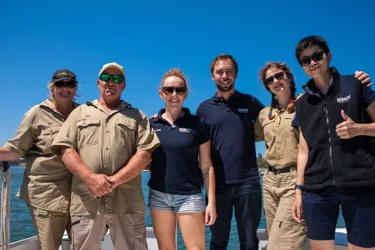Octopus Release
- Thursday 28th September 2023
- octopus

Rescued from seemingly dire circumstances, this resilient cephalopod received the highest level of care, including medical attention and specialised rehabilitation which saw it returned to full health.
As true masters of disguise these cephalopods have garnered a global fascination for their unique ability to mimic the appearance and behaviours of various marine species, such as lionfish, flatfish, and even venomous sea snakes. This remarkable camouflage allows the mimic octopus to blend seamlessly into its surroundings, evading predators, and surprising prey. Primarily found in the warm waters of the Indo-Pacific Ocean, with habitats ranging from Indonesia to northern Australia, their preference for sandy and muddy seabeds provides them with ample opportunities to hide and hunt.

After an extensive search to find the perfect release site, the mimic octopus was taken by boat and released into the water surrounding Makepeace Island.
Oliver Underwood, Curator at SEA LIFE Sunshine Coast said, "this successful release represents more than just rehabilitating a single animal; it embodies our dedication to wildlife preservation and conservation. Collaborations like this one with Wildlife Noosa enable us to advocate for marine life protection and showcase the strength of unity in safeguarding our oceans."
The journey from rescue, through rehabilitation to release underscores the exceptional animal welfare and conservation efforts of both SEA LIFE Sunshine Coast and Wildlife Noosa.
Guests can learn more about conservation projects at SEA LIFE Sunshine Coast by clicking here.
About the mimic octopus:
- The mimic octopi possess a unique ability to mimic the appearance and behaviours of various marine species, such as lionfish, flatfish, and venomous sea snakes. This remarkable camouflage allows it to blend seamlessly into its surroundings, evading predators, and surprising prey.
- Mimic octopus are primarily found in the warm waters of the Indo-Pacific Ocean, with habitats ranging from Indonesia to northern Australia. Their preference for sandy and muddy seabeds provides them with ample opportunities to hide and hunt.
- Unlike other species, mimic octopus are typically solitary creatures, rarely forming social groups. Their solitary lifestyle may be a result of their mimicry tactics, which require them to adapt quickly to changing environments.
- These cephalopods are known for their high intelligence and agility. They are excellent problem solvers and can navigate complex underwater environments with ease, using their sharp wit to outmanoeuvre predators and catch prey.
- The lifespan of a mimic octopus is relatively short, typically ranging from just 9 to 12 months. This brief existence underscores the urgency of their remarkable mimicry skills in the constant battle for survival within the ocean's ever-changing landscape.
About Wildlife Noosa:
- Wildlife Noosa Ltd is a Not-for-Profit Charity which undertakes rescues and the immediate care of all animals, (including domestic pets and livestock), that are ill, injured or 'at risk' of injury in the greater Noosa region. Their work includes water rescues (Noosa River, Lakes & close off shore), and land rescues at Noosa Heads, Noosa North Shore, Tewantin, Noosaville, the beaches, and the hinterland. Read more about Wildlife Noosa online: www.wildlifenoosa.com.au